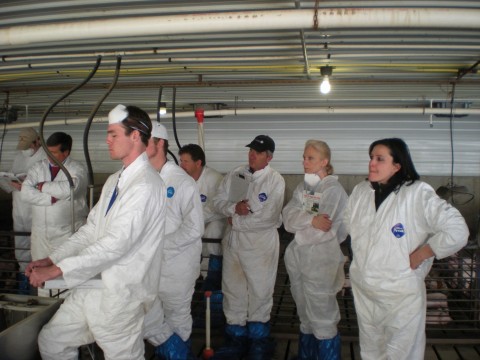"We had the opportunity to take what we learned in the classroom and apply it in a pig production setting, doing health assessments and incorporating communication skills based on various personality types to ensure that protocols are followed," says Chase Stahl, third-year veterinary student at Iowa State and president of the school's AASV student chapter.
Ron White, DVM, manager, technical services at Pfizer Animal Health adds, "We wanted to provide an avenue for veterinary students to be able to identify pigs that may have health conditions or issues and then to quantify the health issues. They would then have the opportunity to communicate those observations and findings and receive immediate feedback on what they had observed."
Students completed a behavioral response (DiSC®) assessment before attending the training session. At the session, they learned how flexing to behavioral tendencies and experience levels can greatly enhance communication. They used these skills to adeptly communicate their observations on husbandry practices to caregivers.
"They taught us the importance of knowing people's background and experience levels, as well as their communication styles," says Jeremy Johnson, third-year veterinary student at Iowa State. "It is key to approach communication with each individual in a way that will get the message across, whether it's someone who walks the pens every day, or is the owner of the operation, each need to understand what is going on at the individual pig level."
The second part of the Individual Pig Care training/certification program allowed students to walk through the pig barn and learn how to identify pigs at different stages of sickness and then report their observations in a role-play exercise.
"We learned a lot about how to find sick pigs at the onset of disease and then were able to do one of the hardest things, practice communicating those observations to others in the operation," says Stahl. "With the role-play exercise, we were able to facilitate our observations using different communication styles and get feedback from experienced veterinarians. It was a great learning experience."
Faculty of Iowa State and Pfizer Animal Health veterinarians assisted students with sick pig identification, conducted communication practice sessions and provided feedback on the students' observations after each session.
"This training will increase and improve the students' effectiveness in terms of taking the technical information and communicating it to the people who can apply it and make a difference in pig health and welfare," says Locke Karriker, DVM, MS Diplomate, ACVPM, associate professor, Veterinary Diagnostic and Production Animal Medicine at Iowa State University. "The communication efficiency and effectiveness will be something that applies to all areas of their life, not only in the pig barn."
The veterinary student training dovetails nicely with another Pfizer Animal Health initiative, Commitment to Veterinarians, where the company is taking a leadership role in supporting veterinarians through continuing education.

Pfizer Animal Health



